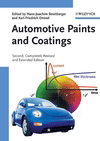Is AI the Catalyst for Growth in Coatings?

As coatings industry technology advances, artificial intelligence (AI) plays a major role in the various developments. People must use it strategically, and be willing to invest time and effort into their attempts. When that happens, the results are so impressive that they could change the industry forever.
Analyzing Critical Aspects Shaping Coating Performance
People often deploy AI to create predictive models to help them understand how something would likely work in the real world. A team built one they believe could significantly impact the coating industry, and sectors such as agriculture and engineering. The model predicted water droplet characteristics after they hit a surface. Many findings could also influence new knowledge about wetting behavior, or how well a liquid applies to smooth or rough surfaces.
As the scientists used their predictive model to study splashing conditions on test surfaces, they learned the coating’s viscosity was only one contributing factor. Other aspects, such as surface roughness and hydrostatic and hydrodynamic pressures, played a role.
The model also predicted droplet sizes and the diameter of the splashing pattern. Such information could help people create new coatings and sprays, especially as they alter how well those products cover a surface during each application step.
Designing New Coatings to Support Emerging Needs
Many coating researchers focus on developing products to fit the world’s future needs. Such was the case when a team used artificial intelligence to make a window coating that could cool a building’s interior without energy. The innovation could be beneficial for meeting emissions-curbing targets in a future where scientists frequently predict climate change will bring more temperature extremes.
The group designed a coating categorized as a transparent radiative cooler to block near-infrared light and ultraviolet rays. They used a layered approach and stacked readily available materials such as silicon nitride and aluminum oxide by alternating them on a piece of glass. The researchers relied on machine learning and quantum computing to determine which layers to use, how to combine them, and which order to place them on the glass base. It only took a fraction of a second to test all combinations.
This method could significantly advance coatings industry technology by prioritizing efficiency and innovation. The best-performing coating could reduce cooling energy use by 31%, compared to windows without it, if used in hot, dry weather.
Changing How Customers Choose Products
As various brands experiment with coatings industry technology, there is an emphasis on applying AI for enhanced customer experiences. In one case, a paint company launched an AI-powered voice recognition tool that allows people to utter relevant phrases about their desired shades. Users start with a relatively broad statement and gradually make the prompts more specific until they reach the desired hue. The tool also provides photos of color possibilities to spark inspiration.
Sometimes, customers have selected certain must-have attributes but need help finalizing the other aspects. For example, powder-coated products in high-traffic areas may need dark and durable options to keep them looking great despite getting dirty through use. A voice-powered AI tool could help them find the best options, primarily if they have already envisioned something but have not come across relevant paint swatches yet.
Many companies have also created AI paint visualizers that work with augmented reality to help people find the ideal interior and exterior shades. Most work by allowing people to capture actual images of their homes and suggesting various options. Those could help users feel more confident during DIY home improvement projects. Then, they may be more open to moving ahead with changes instead of putting them off.
Expanding Product Development Opportunities
Artificial intelligence as a coatings industry technology has also proven its worth by changing how product formulation specialists offer new items. Some laboratory teams are already using it to predict how new formulas will work or suggest new ways to create them.
However, embracing this approach usually requires being open to wholly different product development methods and science-based applications. Plus, people must spend time gathering and preparing the data fed into AI algorithms. The results will only be as reliable as the raw data used to make the predictions.
Some product development models relate to ChatGPT, the generative AI tool that responds in seconds to almost any prompt imaginable. Although the product has notable advantages, people have quickly pointed out the downsides, such as how ChatGPT could spread false or unreliable information. Those issues are likely why paint companies that have worked with the tool often do so alongside other specialized software.
Forward-thinking leaders at one company approved creating 10 paint colors by entering ChatGPT data into paint formulation software. The nature-inspired hues undoubtedly have a novelty element that could become a conversation starter for people who want to be on the cutting edge of new offerings. Using AI to create new colors also positions businesses as being open to new ways to utilize and profit from advancements.
Enterprises have also explored how AI as a coatings industry technology could shorten development time frames, helping them profit faster. One example predicts the mechanical properties and color performance of polymer compounds. Then, people can put more time and energy into the most promising options rather than spending so many hours on trial and error-driven processes.
Improving Coating Monitoring and Performance
People usually apply coatings to achieve specific outcomes. Corrosion protection is a common reason to use them, especially on outdoor surfaces. One way to use AI as a coatings industry technology is to monitor how well specific protective products work when exposed to the elements.
Consider the example of a project where people used AI to improve corrosion control mechanisms in the oil and gas industry. Corrosive wear on a pipeline or other critical infrastructure could cause catastrophic leaks, leading to emissions problems and health threats if not rectified.
Some people install sensors on pipelines to track the various environmental factors that lead to corrosion. They can then use AI algorithms and the data to develop coatings that slow the corrosive effects better than current options. Similarly, once people apply a new coating, the same sensor network could verify whether it works as well in real life as it did in the lab.
In another case, researchers used machine learning to produce a coating that selectively adsorbed or repelled numerous chemicals and biological molecules. The team worked with polymer brush films, which form to create coatings with the desired properties. They trained their algorithm by exposing it to data from 51 films of various thicknesses and densities. The outcomes suggested this work could improve the methods used to develop anti-biofouling coatings.
AI Is a Coatings Industry Technology Worth Following
Professionals in the coatings industry have used AI for several years to enhance their processes. These examples are becoming even more common due to the widespread availability of products such as ChatGPT. AI applications are just starting to shake up the industry, so there is a lot for you to anticipate.
Looking for a reprint of this article?
From high-res PDFs to custom plaques, order your copy today!







